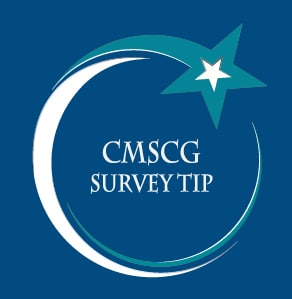This week on the CMSCG Blog, our “Ftag of the Week” is another training requirement, F941 Communication Training. We had reviewed a couple of the training requirements in a March 2019 Ftag of the Week post, but now there’s significantly more guidance to work with. The regulation requires that nursing homes have mandatory training for direct care staff regarding effective communications – but what does that really entail?

“Effective Communications” is defined as the process of dialogue between individuals so they can understand what they are trying to communicate. It requires skills such as understanding how to speak to others in a way that they can understand, as well as being an active listener and recognizing both verbal and nonverbal cues.
Effective communication helps staff understand what a resident is trying to communicate so staff can appropriately respond. It also helps staff to effectively provide information to residents. This helps to ensure that residents are provided with information in a language and manner they can understand, which is part of multiple regulatory requirements. The Interpretive Guidance (IG) states that nursing facilities are required to inform residents of their total health status and provide notice of rights and services to residents in a language they can understand. This includes oral notices as well as written information.
It is worth noting that the definition of “communications” includes the use of devices that a resident may require, such as TTY/TTD. The updated regulations emphasize that staff who interact with residents utilizing communication devices need to know how to use the devices effectively. The definition also includes use of cellular devices and accessibility, including reasonable access and privacy for electronic communication, such as video conferencing or email.
Communication Training
The Centers for Medicare & Medicaid Services (CMS) has left the content of this training up to providers by stating the content should be based on the needs of the staff and the residents and should be informed by the Facility Assessment. However, the Agency has also provided a list of “recommended” methods of communication in the regulation, which implies that it would behoove providers to include these best practices in their training content.
CMS recommends, as part of the IG, that staff effectively communicate by:
- Identifying themselves and using the resident’s name every time they speak with the resident
- Speaking slowly, clearly and using short, simple words vs. medical jargon or slang
- Using proper names for people/places/items instead of pronouns or “it”
- Avoiding distractions
- Using visual aids if required for communication
While some of the recommendations above are communication basics and make common sense, there are a couple others where staff may need some reminders, especially since there is a lot of rushing and sometimes taking a few extra minutes to listen falls to the wayside. This will be one of those pitfalls during resident interviews related to sufficient staffing concerns. Other techniques that are recommended related to effective communication include:
- Allowing extra time for the resident to speak, process the information that has been provided to them and to respond or request clarification
- Listening carefully to what the resident is saying and directly responding to what the resident has said, especially when there is a concern
- Eliminating assumptions and making adjustments to the way they communicate as needed
- Repeating back what a resident has said to ensure they understand what has been said – and asking for clarification if they aren’t sure
- Simplifying written communication by sticking to one topic at a time, summarizing key points, and simplifying the questions as needed
- Sitting face to face with residents when communicating with them. This is especially importance for residents who may need to read lips or who have vision or hearing loss
Two other areas where recommendations have been made – and CMSCG is recommending you take a harder look at in your own facility – is ensuring communication is culturally appropriate and that staff understand nonverbal communication.
Culturally Appropriate Communication
The recommendations also include some culturally specific communication considerations, such as whether staff should maintain eye contact or not. Don’t forget about residents whose native language is not English – how are staff communicating with these residents and what education have they received to assist with this type of communication? Ensuring staff have cultural competency and residents’ cultural preferences have been incorporated into their plans of care will be especially important going forward. It is simply tied into many regulations.
Non-Verbal Communication
The recommendations also include awareness of nonverbal communication. Staff need to be aware of a resident’s body language during communication. However, this is not a one-way street. It is critical that staff recognize that their own nonverbal communication is appropriate since body language may be very apparent to residents, especially those living with dementia who may react negatively to it.

As such, staff should understand their responsibility to maintain a positive attitude, pleasant tone of voice and pleasant facial expression – regardless of what is going on. That’s likely one of the biggest challenges staff face on a daily basis and should be reinforced during training as well as when observed on a nursing unit.
The regulation provides several resources that can be used as training resources, so utilizing these resources could be a good jumping off point to improve your staffs’ communication skills, especially if you honestly identify where your existing training may need a little bit more clarity and detail.

Communication training utilizing a role-playing format is an eye opener in many instances. Sometimes looking at what and how you are communicating both verbally and non-verbally through the eyes of someone else is a very meaningful exercise.